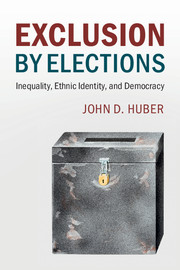Book contents
- Frontmatter
- Contents
- List of Figures
- List of Tables
- Acknowledgments
- 1 Introduction
- 2 Why Worry about Inequality and Ethnic Politics?
- PART I THE THEORETICAL ARGUMENT
- PART II EMPIRICAL EVIDENCE FOR THE ARGUMENT
- 6 Theory and Causal Identification
- 7 Income and Voting Behavior
- 8 Inequality, Ethnic Diversity, and the Ethnification of Party Systems
- 9 Social Structure, Redistribution, and Democratic Transitions
- 10 Conclusion: Inequality and the Politics of Exclusion
- References
- Index
- Miscellaneous Endmatter
9 - Social Structure, Redistribution, and Democratic Transitions
from PART II - EMPIRICAL EVIDENCE FOR THE ARGUMENT
Published online by Cambridge University Press: 18 May 2017
- Frontmatter
- Contents
- List of Figures
- List of Tables
- Acknowledgments
- 1 Introduction
- 2 Why Worry about Inequality and Ethnic Politics?
- PART I THE THEORETICAL ARGUMENT
- PART II EMPIRICAL EVIDENCE FOR THE ARGUMENT
- 6 Theory and Causal Identification
- 7 Income and Voting Behavior
- 8 Inequality, Ethnic Diversity, and the Ethnification of Party Systems
- 9 Social Structure, Redistribution, and Democratic Transitions
- 10 Conclusion: Inequality and the Politics of Exclusion
- References
- Index
- Miscellaneous Endmatter
Summary
The theoretical argument suggests that when the conditions for ethnic politics are met, some rich – those in the winning group – benefit from government distribution, and some poor – those in the losing group – are excluded from government redistribution. By contrast, when the conditions for class politics are met, all of the nonrich receive distributive benefits, while the rich all receive none. Thus, the extent to which electoral politics encourage government actions that reduce inequality should depend on the conditions that encourage ethnic and class politics, and thus on inequality, ethnic polarization, and their interaction.
Chapter 8 noted that the interaction between inequality and ethnic polarization could manifest itself in different ways that are consistent with the theoretical model. In the analysis of ethnic voting, which included a quite broad range of countries, I found that when ethnic diversity was low, there was a strong effect of inequality on ethnification of party systems. As ethnic diversity increased, the estimated effect of inequality on voting decreased. This is consistent with the idea that when it is possible to form a relatively small electoral majority based on ethnic groups, inequality has little effect on voting outcomes because there are incentives for ethnic politics at almost any level of inequality. As societies become more homogeneous, inequality should become more salient, with greater inequality tipping politics in the direction of ethnic rather than class coalitions. Thus, the effect of inequality on ethnic voting should be positive, but it should decline as the ethnic diversity of society increases, disappearing when society is sufficiently diverse that it's difficult for class politics to prevail at any level of inequality.
If patterns of redistribution reflect these voting patterns, then we should see the same type of interaction between inequality and ethnic diversity. When ethnic polarization is relatively low, inequality should have a relatively strong negative relationship with redistribution, with more inequality leading to less redistribution. As ethnic diversity increases, the relationship between inequality and redistribution should weaken.
- Type
- Chapter
- Information
- Exclusion by ElectionsInequality, Ethnic Identity, and Democracy, pp. 160 - 182Publisher: Cambridge University PressPrint publication year: 2017



